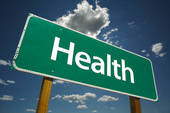 You can improve your sleep by eating more plant foods that provide carbohydrates—fruits, vegetables, beans, and whole grains. These tend to produce a slow, steady rise in blood insulin that helps the amino acid tryptophan enter the brain. Tryptophan is used to make serotonin, a neurotransmitter that helps induce sleepiness along with improving your mood (and who knows—it just might stimulate good dreams).
You can improve your sleep by eating more plant foods that provide carbohydrates—fruits, vegetables, beans, and whole grains. These tend to produce a slow, steady rise in blood insulin that helps the amino acid tryptophan enter the brain. Tryptophan is used to make serotonin, a neurotransmitter that helps induce sleepiness along with improving your mood (and who knows—it just might stimulate good dreams).This chemistry explains why the time-honored glass of warm milk before bed may actually do the trick: Milk provides a dose of tryptophan while also inducing a release of insulin. By the way, the supposed sedative effect of the Thanksgiving turkey—which, like many kinds of meat, contains tryptophan—is more likely due to the size of the holiday meal. But while a big meal may make you sleepy, digesting it could make for a very restless night.
Certain foods and drinks can disturb your slumber. The stimulant caffeine—in soda, coffee, some teas, and chocolate—will interfere with sleep if you ingest it within four hours of bedtime. An alcoholic drink can make you drowsy, but metabolizing the sugar can disrupt your shut-eye (some people overheat). Sugary treats eaten just before bed can likewise raise your body temperature and leave you restless.
Your diet can also have an indirect effect on your sleep. Being overweight can lead to the heavy snoring and interrupted breathing of sleep apnea, for example. And eating a lot of simple carbohydrates (sweets) and refined starches (white flour, rice), which continually causes your blood sugar to spike and fall, may throw off the hormones that regulate metabolism. This can derail the body's natural rhythms and cause wakefulness at night.
(Source: www.oprah.com)





No comments:
Post a Comment